Related Research Articles
The Administrator of the Northern Territory is an official appointed by the Governor-General of Australia to represent the government of the Commonwealth in the Northern Territory, Australia. They perform functions similar to those of a state governor.
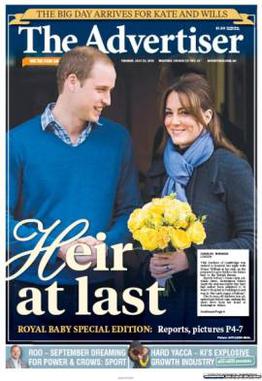
The Advertiser is a daily tabloid format newspaper based in the city of Adelaide, South Australia. First published as a broadsheet named The South Australian Advertiser on 12 July 1858, it is currently a tabloid printed from Monday to Saturday. The Advertiser came under the ownership of Keith Murdoch in the 1950s, and the full ownership of Rupert Murdoch in 1987. It is a publication of Advertiser Newspapers Pty Ltd (ADV), a subsidiary of News Corp Australia, itself a subsidiary of News Corp. Through much of the 20th century, The Advertiser was Adelaide's morning broadsheet, The News the afternoon tabloid, with The Sunday Mail covering weekend sport, and Messenger Newspapers community news. The head office was relocated from a former premises in King William Street, to a new News Corp office complex, known as Keith Murdoch House at 31 Waymouth Street.

Boyle Travers Finniss was the first premier of South Australia, serving from 24 October 1856 to 20 August 1857.
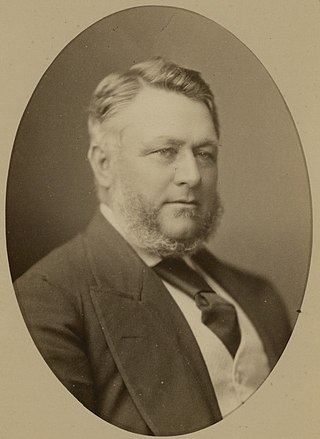
Sir Henry Ayers was the eighth Premier of South Australia, serving a record five times between 1863 and 1873.
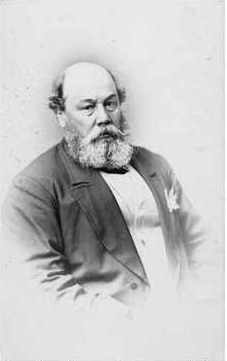
Sir Arthur Blyth was Premier of South Australia three times; 1864–65, 1871–72 and 1873–75.
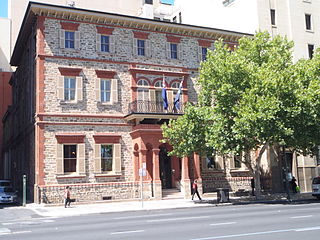
The Adelaide Club is an exclusive gentlemen's club situated on North Terrace in the South Australian capital city of Adelaide. Founded in 1863, the club comprises members of the Adelaide Establishment.

Thomas Quinton Stow, generally referred to as the Rev. T. Q. Stow, but also as Quinton Stow, was an Australian pioneer Congregational minister.
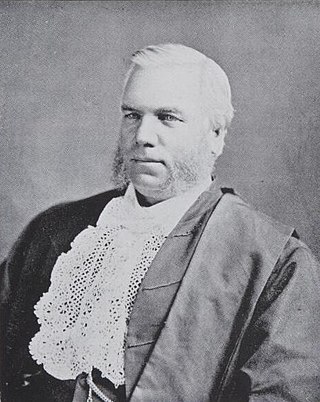
Sir William Milne was an Australian entrepreneur and politician, serving as the member for Onkaparinga in the South Australian House of Assembly from 1857 to 1868. He was elected to the South Australian Legislative Council in 1869, and was President of the South Australian Legislative Council from 25 July 1873 to 1881.

The Adelaide Football Club, often referred to as the Old Adelaide Football Club, was an Australian rules football club based in Adelaide. Founded on 26 April 1860, it was the first football club formed in South Australia.
James Robin was a prominent businessman in the early days of colonial South Australia. Several of his descendants were significant, in the Methodist Church and other fields. Also worthy of mention are his brothers Charles and Theophilus Robin.
A Rough Passage is a 1922 Australian silent film directed by Franklyn Barrett based on the novel by Arthur Wright. It was Barrett's final feature and is considered a lost film.
George Alfred John Webb was an English painter who had a considerable career in Australia painting portraits of South Australian and Victorian public figures. In correspondence, he signed his name "George A. J. Webb"; many of his paintings, but not all, were signed simply "WEBB".
Cawthorne and Co, also known as Cawthorne's Limited, was a company founded in 1870 in Adelaide, South Australia, by Charles Cawthorne and his father William Anderson Cawthorne, which dealt in musical instruments, sheet music and recordings, and acted as concert promoters.
The First Dutton Ministry was the 9th Ministry of the Government of South Australia, led by Francis Dutton. It commenced on 4 July 1863, when Dutton, who had moved the motion to oust his predecessor, was sworn in to lead what was reported to be an interim ministry to deal with the Tariff Bill. However, the ministry was defeated on a series of adjournment votes on its first sitting day in parliament, and announced their resignation for lack of the parliament's confidence. Randolph Isham Stow was sent for but failed to win support to succeed Dutton, and with former Premier George Waterhouse and Arthur Blyth both lacking support, Henry Ayers was finally sent for and sworn in heading the First Ayers Ministry on 15 July.
The Second Ayers Ministry was the 11th Ministry of the Government of South Australia, led by Henry Ayers. It commenced on 22 July 1864, when Ayers succeeded in reconstituting his ministry following its defeat on a no-confidence motion. It collapsed within days when both the new ministers, William Milne and Randolph Isham Stow, resigned, necessitating the resignation of the entire ministry. It was succeeded on 4 August 1864 by the First Blyth Ministry.
The First Blyth Ministry was the 12th Ministry of the Government of South Australia, led by Arthur Blyth. It commenced on 4 August 1864, when Blyth succeeded in forming a ministry following the resignation of the Second Ayers Ministry. It was succeeded by the Second Dutton Ministry on 22 March 1865, when Francis Dutton won the support of the new parliament that had been elected at the 1865 election.
The District Council of Glanville was a local government area in South Australia from 1864 to 1888.

Job Harris, was a store keeper, post master, hotelier, gold miner and South Australian prominently associated with the discovery of gold at the Barossa Goldfields, the largest gold rush in the colony of South Australia.
References
- ↑ "Statistical Record of the Legislature, 1836-2009" (PDF). Parliament of South Australia. Archived from the original (PDF) on 11 March 2019. Retrieved 8 October 2015.
- ↑ "SOUTH AUSTRALIA". The Cornwall Chronicle (Launceston, Tas. : 1835 - 1880) . Launceston, Tas.: National Library of Australia. 22 July 1863. p. 5. Retrieved 9 October 2015.
- ↑ "The Advertiser ADELAIDE: TUESDAY, JULY 26, 1864". The South Australian Advertiser (Adelaide, SA : 1858 - 1889) . Adelaide, SA: National Library of Australia. 26 July 1864. p. 2. Retrieved 9 October 2015.